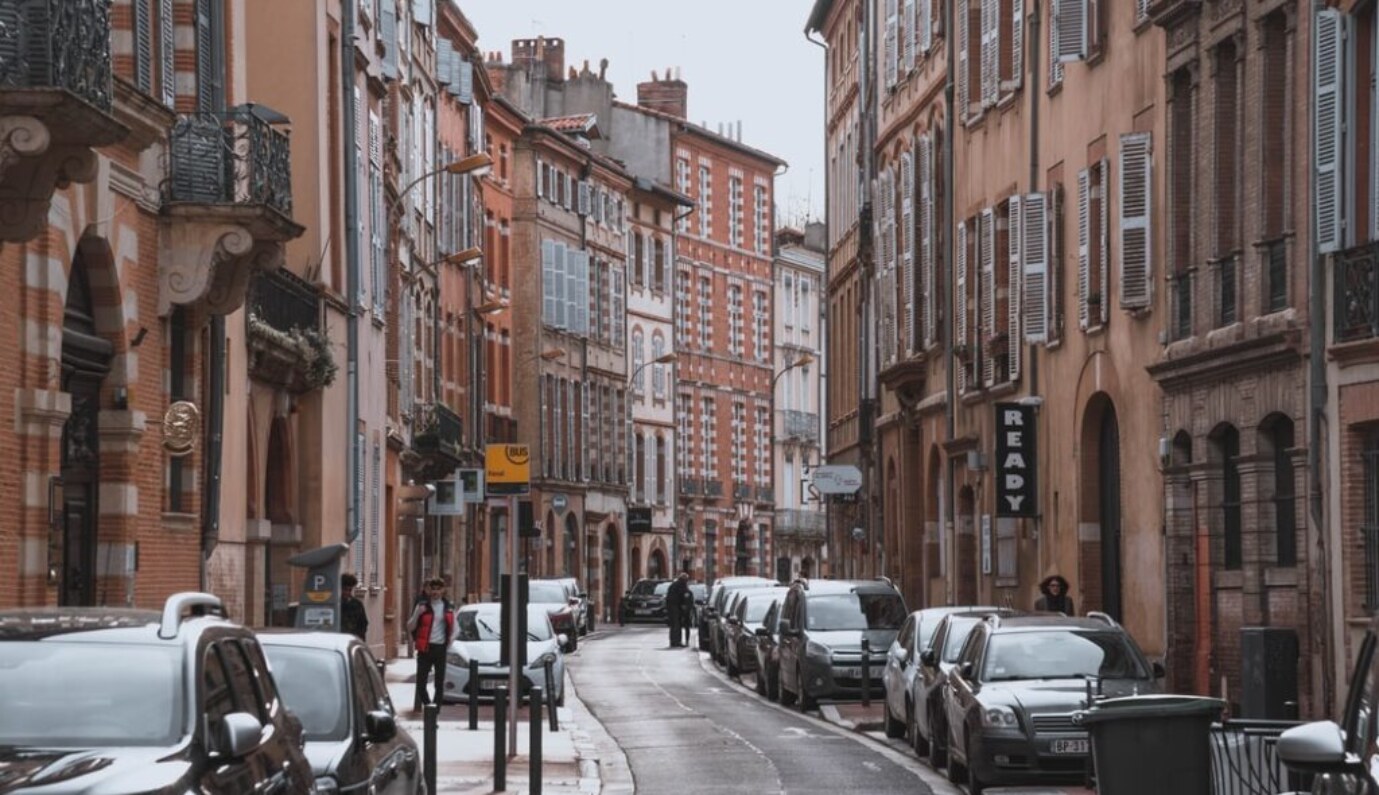Colorful, young and bustling: Toulouse is without a doubt one of the most lively cities in France. You will like its warmth (literally and figuratively), its festive atmosphere, its rugby vibe and its scenic views along the Garonne river.
With over 460,000 inhabitants, Toulouse is the fourth biggest city in France after Paris, Marseille and Lyon. Beyond the city’s limits, its urban area gathers more than 1,340,000 inhabitants. The city experiences a rapid demographic growth: it gained more than 30,000 inhabitants between 2001 and 2015. It is the French city with the fastest growth.
Key figures
-
Average age: 36 yo
-
Median income (Urban area): 1 830 € / month
-
Foreigners: 11,9 %
-
Renting price: 13 €/sqm
Cost of living
The cost of living in Toulouse is very variable depending on the area of the city you live in. It is hard to compare the cost of living of a student living near the University Paul Sabatier and that of a young worker living in the city center.
Overall, the cost of living is correct, and favored by a stable transportation cost, while it is increasing in new cities in France, to the tune of 102 euros per year per student. A student spends an average of 881 euros per month, all expenses included according to 2019 UNEF (Union Nationale des Etudiants de France) study.
Regarding the cost of housing, we note an average of 13€ / m2 for the whole agglomeration for rentals. To purchase, count 3440 € / m2.
Of course, if you get closer to the hyper-center, around Capitole, Carmes, Esquirol or Saint-Georges, count more. Up to 4990 € to buy and up to 17 € / m2 to rent.
For food, to give you an idea of the price of a meal in a popular restaurant, start with about 15 euros. Finally, for a Coke or a cappuccino in a café, expect 2.5 € to 3.0 €.
Safety
Concerning security in Toulouse, this is not the most advantageous point of this beautiful city which is growing rapidly compared to other French cities. This is the flip side of a fast development of a popular city.
Nevertheless, you will be able to walk around safely in the different areas of the city. You may sometimes feel oppressed in certain areas of the city, especially at night.
But Toulouse is not a dangerous city. It appears in 9th position in the ranking made by France Délinquance, while it is the 4th largest city in France. It is classified behind cities like Paris, Marseille, Lyon or Nice. In fact, it is a necessary geographical approach to this subject. An average hides many disparities. Avoid neighborhoods like Le Mirail or Bagatelle. They are considered the hot areas of Toulouse, with acts of violence and many traffics.
For the rest, you will enjoy discovering Toulouse.
Employment
A true technopole in Europe, Toulouse brings together various industries in different sectors such as aeronautics, IT and aerospace. Its attractiveness continues to grow and professional opportunities are numerous. Moreover, Occitanie area represents one of the regions that created the most jobs in France over the last few years, driven by the development of the above-mentioned sectors of activity.
For a long time, however, Toulouse was not considered an industrial city. But in the 20th century, aeronautics became the economic engine of the agglomeration. The presence of Airbus and many subcontractors makes the region dynamic. In addition to aircraft production, Toulouse is now also home to other high-tech industries such as aerospace.
The personal and business services sectors are also looking for various profiles, particularly in sales. Computer and telecom is a perfect example. The Toulouse region is looking for experienced profiles, especially in new technologies as well as on security issues.
Other sectors such as biotechnology, IT (Cap Gemini), health (Sanofi Pasteur), real estate, construction and food processing all contribute to the dynamism of the pink city.
Education
Toulouse was the 3rd largest university in France with 132 400 students enrolled at the Toulouse Academy in 2015, positively influencing the dynamism the city. It thus has quality cultural equipment such as the museum of modern and contemporary art at the Abattoirs, the José-Cabanis medias library, the Zenit, the national Theater of Toulouse and the Cité de l’Espace.
15 % of Toulouse students are foreigners to obtain one of the 500 bachelor’s or master’s degrees.
17 higher education and research establishments are members of the University of Toulouse. The main one being the University Toulouse 1 Capitole, is today an university of law, economy and management and counts 21 200 registered students.
Depending on your interests, Paul Sabatier University can meet your needs. It offers courses ranging from the Diplôme d’Etudes Universitaires Scientifiques et Technique to the master’s degree and the engineering degree, including professional or general licenses and bachelor…
But you have other choices. You can study in a private school of higher education and commit to 2, 3, 4 or 5 years depending on the specialty and the type of institution. Some engineering or business schools offer alternance courses.
Administrative procedures
Students from the European Free Trade Association (EFTA) and the European Union do not need a visa to study in France.
However, for students from a third country, you must apply for and obtain a student visa. For more information, click here.
Atmosphere & Culture
The Pink City would not be as prestigious without its famous river, the Garonne, which crosses it for a length 16,3 km including 16 km of dyke. Its five main bridges which are the Pont-Neuf, Pont Saint-Pierre, Pont-Jumeaux, Pont des Catalans and Pont Saint-Michel allow the junction between the two banks of the Garonne and enrich historical heritage of the city.
The city’s rich cultural heritage (architectural, artistic) makes it a city of art and history, with many museums and magnificent buildings of which the Capitol is a perfect example.
Its colorful landscape is characteristic of a color, pink, which became the emblem. It carries within both the nuance of the ancestral material of terracotta, the diversity of construction techniques and the richness of a millennial architectural heritage.
Toulousains carry in them a singing accent, that of the South. It is different from others cities, and warm. In the eyes of many people, it evokes the joy of life and the sunshine of the city. Be beware of amalgams, because the accent does not makes any less serious people.
But Toulouse is also the stronghold of French rugby. The city’s club, the “Stade Toulousain” is the most successfull club in the French Rugby Championship, having won it 21 times. The city of Toulouse also played in 7 finals of the European Cup for Clubs, and won the famous and coveted H Cup five times. The Ernest-Wallon stadium is located near the Toulouse-Blagnac airport.
Choose your neighborhood in Toulouse
According to your tastes and your aspirations, your profile, the various districts of Toulouse can satisfy your expectations or not. Located in the historic city center and on the right bank of the Garonne, the Carmes district is very lively, close to Esquirol Square and 8 to 10 minutes walk from Place du Capitole. Quieter because not being crossed by a major road artery as is the case for Esquirol, but just as lively as the latter, Les Carmes is full of atypical bars and restaurants. The development of the district has gradually been built around its famous market hall, now converted into a parking lot and which also gives way to a covered market. It is one of the oldest districts of the pink city. It perfectly represents the culinary / gastronomic and festive identity of Toulouse. Residential and dynamic area, it offers a particularly suitable setting for residents wishing to school their children in the neighborhood, and carry out beautiful walks along the Garonne. Its typically Toulouse pink bricks helps to make the atmosphere of the neighborhood so endearing.
Then, on the left bank of the Garonne, the district of Saint-Cyprien is in full expansion, and without a doubt the most popular and lively district of the left side. Both steeped in history and cosmopolitan, it perfectly embodies the spirit and the lifestyle of the pink city. In the middle of its lively streets, you will find many cafes, restaurants and bars. To add to the aesthetics of the district, Saint-Cyprien is bordered by the Garonne river on all its eastern side and connected to the city center by 4 of the 7 Toulouse bridges. With its parks, museums, market and iconic buildings, the neighborhood offers many options to experience the city from different angles. Saint-Cyprien has remained a popular neighborhood where city lovers of all generations live together.

